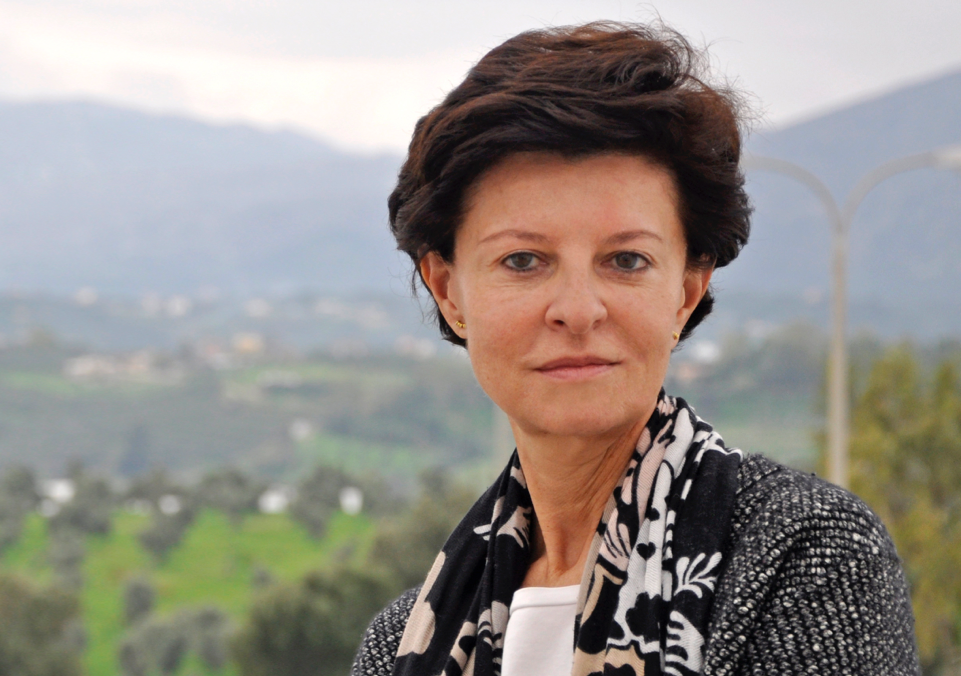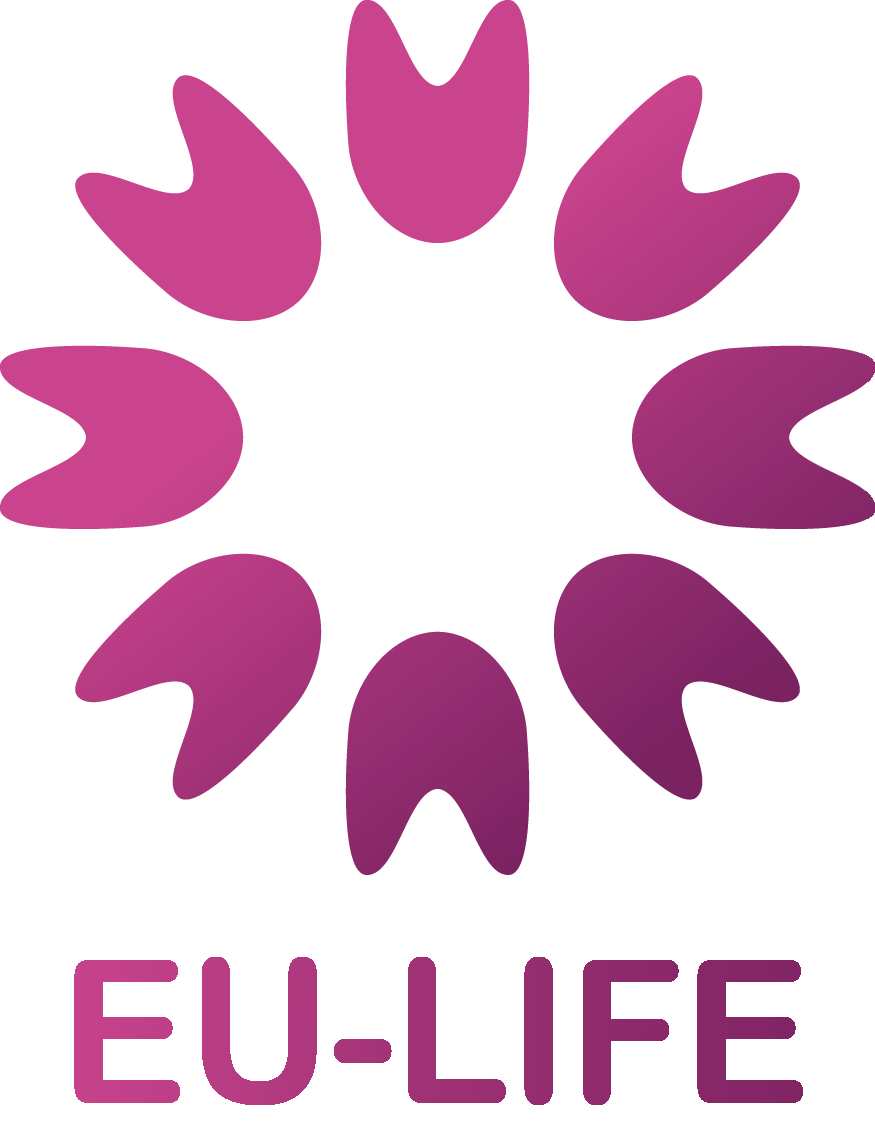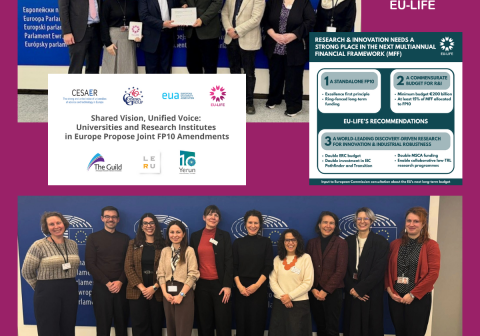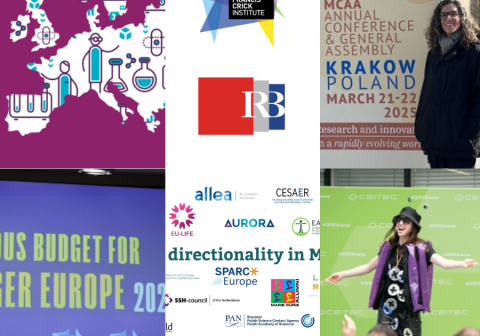Creating a Center of Excellence: an interview with Electra Gizeli
Electra Gizeli is Group Leader at the Institute of Molecular Biology and Biotechnology (IMBB) at the Foundation for Research and Technology – Hellas (FORTH) and Professor in the Department of Biology at the University of Crete in Greece.

You lead one of the research groups at IMBB. Could you let us know about your research? What are you working on at the moment?
Our lab is very multidisciplinary with our research lying at the interface of molecular biology, biomedical engineering and nano-biotechnology. We combine fundamental and applied research, with technological innovation being a central focus. One main aspect of our current work is the design of molecular biology isothermal amplification assays combined with 3D-printed portable instrumentation.
This work has resulted in innovations currently exploited to provide simple tools for molecular diagnostics at the point-of-care anywhere in the world. We are now applying these technologies to address an expanding range of pertinent issues within the “One-Health” concept, including monitoring of human, plant and food-borne diseases as well as marine environmental monitoring.
All our assays and measuring units are implemented in both the developed and developing countries where we continuously collaborate with end-users for testing (South Africa, Tunisia, UK, Germany and France).
You are currently coordinating the creation of DxHub, a Center of Excellence to promote innovative solutions for the detection of infectious diseases. What are the main objectives of DxHub?
The Excellence Hubs are part of the focusing on innovation ecosystems in widening countries to team up and create better linkages between academia, business, government and the society, the latter referred to as the quadruple helix.
Within the above concept, our DxHub was based on “Connecting Greek and Portuguese innovation ecosystems to develop a Hub for infectious diseases diagnostic solutions at the point-of-care tackling cross-border threats”, with FORTH being the Greek coordinator and Universidade NOVA Lisbon (NOVA) the Portuguese one.
The DxHub project will start on 1 January 2025. Its objectives are first, to unlock complementary innovation capacities present in the two partners’ ecosystems related to diagnostics for One-Health by creating linkages between research, business, societal and regional partners. Second, to advance research & innovation projects of the Greek and Portuguese partners to provide solutions of regional and European significance applicable to the health, veterinary and agri/food diagnostics, all outside a dedicated lab. Thirdly, to translate research and innovations to viable products via a joint investment plan consolidating sustainability measures. Another key objective of the project is the training of the ecosystem participants from the quadruple helix within and between the 2 ecosystems, leading to the nurture of the next generation of innovators/entrepreneurs. Finally, we want to enhance the visibility of research results in the economy and society by increasing public awareness on infectious diseases, the need for diagnostic and surveillance solutions at the point-of-care and importance of translating research and innovation results to the society.
Why do we need new systems to monitor infectious diseases? Why are the current methods not enough?
Infectious diseases affecting humans are an emerging threat to the EU particularly in the south of Europe and the Mediterranean where the climate and richness of the wetland ecosystem enable the successful amplification of several arthropod species and vector borne pathogens. Diseases such as the West Nile virus, Arboviruses and malaria are an emerging burden for Greece and Portugal and are likely (or have already started) to spread in Europe due to climate change, global urbanization and citizens’ mobility. Animals which share our susceptibility to infectious diseases also provide opportunities for diseases to pass to people (e.g. SARS, Ebola, COVID-19). Major livestock losses have been reported caused by sandfly and tick-borne pathogens while Coxiella burnetii and Brucella, endemic to the Crete region, affect both humans and animals of veterinary importance (sheep, goats and cattle). The southern part of Europe is exposed to the migration of wild birds from North Africa many of which are infected and occasionally die serving as an early warning of human illnesses. Finally, agriculture is also affected by emerging arthropod pests and diseases leading to significant losses.
The development of solutions to build resilience towards the management of existing/emerging diseases globally requires as a first step rapid and accurate diagnosis, ideally on the spot of the infection, and by using highly sensitive and specific diagnostic tools.
What are the expected impacts of DxHub? How do you think it will change disease diagnosis in Europe and beyond?
Within the DxHub project, we expect to use cutting-edge science and innovations in Crete (Greece) and Oeiras (Portugal), to produce excellent, breakthrough solutions in diagnostics, including the development of novel platforms and devices, molecular isothermal assays and protocols, newly developed antibodies and ELISA kits and apps for mobile operation and data transfer for surveillance.
Moreover, we want to see the translation of the results from the lab to those who need them, increasing business opportunities, competitiveness and sustainability in the two regions. Establishing an innovation culture through training is another expected impact of the project and for this reason we have included supported actions such as a cross-regional job rotation scheme among the four actors per ecosystem, industrial PhD/MSc fellowships for joint research, pre-acceleration programs, and masterclasses on entrepreneurship, IP, business plan creation and soft skills.
In addition to the local impact, DxHub is expected to have a broader societal impact through addressing national, EU and global challenges related to emerging threats.
The scientific focus of the proposal, employing smart but simple technologies, suits particularly well to a community-based approach. Human infectious diseases, have a strong community component. At a local level and in the short term, farmers, food producers and relevant industries will benefit from the new tools, experiencing reduced crop losses and food-retractions or damage due to contamination.
Services can also benefit from readily available POC devices and methods for infectious disease testing, especially during a pandemic like the one we experienced recently which affected enormously local economies. All the above will help Europe to develop new technologies to address some of the most pressing societal challenges, such as the need for continuous monitoring of emerging health threats, but also to bring them to the market, in line with the New European Innovation Agenda established in 2022.
DxHub is the result of a partnership between different public and private institutions in Crete (Greece) and Oeiras (Portugal). Are these regions particularly suitable for the centre of excellence? Do they have an added value for this project?
Greece and Portugal are both located in the southernmost part of Europe facing Africa and have a population of ~10M people. The similarities in geography and climate influence culture, business and key sectors driving the economy of each country: services rank first, followed by industry and agriculture. Both countries face common public health, agriculture and farming challenges some of which are global as well. In addition, in both regions there is ample of evidence demonstrating the existence of regional ecosystems on diagnostics, through the participation of research groups with a track record on excellent research supported by competitive EU and national funding and local initiatives for collaboration between research Institutes, regional authorities and end-users.
By teaming together, the Greek and Portuguese regional partners can unite to reinforce their excellence and ability to translate research and innovation results into useful solutions, advance their innovation capacity by consolidating fragmented efforts and team academic, regional authorities, business and societal actors from both sides to increase completeness and resilience.
Find out more about DxHub on their website: https://dx-hub.eu/



